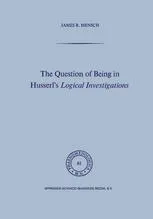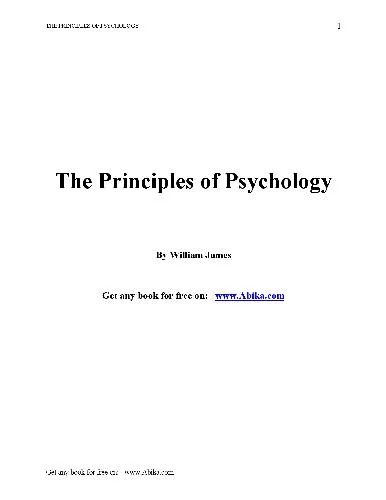The Principles of Psychology, Vol. 1
4.5
بر اساس نظر کاربران

شما میتونید سوالاتتون در باره کتاب رو از هوش مصنوعیش بعد از ورود بپرسید
هر دانلود یا پرسش از هوش مصنوعی 2 امتیاز لازم دارد، برای بدست آوردن امتیاز رایگان، به صفحه ی راهنمای امتیازات سر بزنید و یک سری کار ارزشمند انجام بدینکتاب های مرتبط:
معرفی کتاب 'The Principles of Psychology, Vol. 1'
کتاب 'The Principles of Psychology, Vol. 1' اثر ویلیام جیمز یکی از مهمترین و تاثیرگذارترین آثار در حوزه روانشناسی است که نگاهی جامع به عملکرد ذهن و رفتار انسان ارائه میدهد.
خلاصهای از کتاب
کتاب 'The Principles of Psychology, Vol. 1' به بررسی اصول بنیادین روانشناسی میپردازد و مفاهیمی چون هوشیاری، ادراک، توجه، حافظه، اراده، و هیجان را تحلیل میکند. ویلیام جیمز به عنوان یکی از پیشگامان روانشناسی مدرن، تلاش کرده تا میان تجربیات ذهنی و مشاهدات علمی پلی بزند. او در این کتاب به موضوعاتی همچون فیزیولوژی و تأثیر عقل بر رفتارهای انسانی پرداخته و رویکردی جدید به علم روانشناسی ارائه میدهد.
نکات کلیدی
- ادغام روانشناسی تجربی با فلسفه و فیزیولوژی برای ایجاد یک دانش جدید.
- شناخت اهمیت 'Self' و نقش آن در تفکر و رفتار انسانها.
- تمرکز بر Dynamic Systems و پیچیدگیهای ادراکی و حسی.
- بررسی نقش احساسات و هیجانات در فرآیندهای تصمیمگیری.
نقلقولهای معروف از کتاب
"The greatest weapon against stress is our ability to choose one thought over another."
"The art of being wise is the art of knowing what to overlook."
چرا این کتاب اهمیت دارد
کتاب 'The Principles of Psychology, Vol. 1' اولین بار در سال ۱۸۹۰ چاپ شد و تاکنون به عنوان منبع مرجع بسیاری از پژوهشگران و دانشجویان روانشناسی مورد استفاده قرار میگیرد. ویلیام جیمز در این کتاب با ارائه مفاهیم روانشناسی به گونهای ساده و قابل فهم، راه را برای نسلهای آینده این علم هموار کرده است. این کتاب نهتنها به شناخت بهتر ذهن و رفتار انسان کمک کرده، بلکه به ترکیب و گسترش دامنه عملی و علمی روانشناسی نیز پرداخته است، به طوری که هنوز هم در رشتههایی چون علوم اعصاب، فلسفه ذهن، و روانشناسی تربیتی مورد استناد است.
Introduction
Welcome to an exploration of "The Principles of Psychology, Vol. 1," a seminal work by William James that lays the foundation for modern psychological thought.
This book was first published in 1890 and continues to be a cornerstone in the study of psychology. With its comprehensive examination of various psychological phenomena, James’ work has influenced an array of disciplines such as philosophy, cognitive science, and education. This introduction provides readers with an insightful understanding of the book's contents, its key takeaways, and the reasons why it remains a pivotal contribution to psychology.
Detailed Summary
William James' "The Principles of Psychology, Vol. 1" is more than just a textbook; it is a profound narrative exploring the complexity of human thought and behavior. The book is divided into several chapters, each dissecting various aspects of psychology. James begins by exploring the history and methods of psychology, laying an empirical foundation. He introduces the concept that psychology is the science of mental life, both of its phenomena and their conditions.
James delves into the brain's importance and the nervous system as a foundation for understanding human consciousness. He explicates on topics such as sensation, perception, imagination, and reasoning, providing detailed insights into the structure and function of these mental processes. His treatment of consciousness, notably the 'stream of consciousness,' sets a new paradigm for understanding how humans experience their inner lives.
The later chapters of the book explore the concepts of habit, will, attention, and the self. James articulates how habits are ingrained through repetition and play a critical role in shaping behavior. He emphasizes the importance of free will in the psychological landscape, providing a nuanced view differing from deterministic perspectives. James' profound insight into the self paves the way for future explorations of identity and personality psychology.
Key Takeaways
- The book lays the groundwork for experimental psychology and behavioral sciences.
- Introduces key concepts such as the 'stream of consciousness' and the importance of habit in behavior formation.
- Highlights the empirical study of mental life and argues for the inclusion of introspection in psychological studies.
- Explores the relationship between physiology and psychology, establishing the notion that mental states are deeply connected to physical processes.
Famous Quotes from the Book
"The greatest discovery of my generation is that a human being can alter his life by altering his attitudes."
"My experience is what I agree to attend to. Only those items which I notice shape my mind."
"Habit is thus the enormous fly-wheel of society, its most precious conservative agent."
Why This Book Matters
"The Principles of Psychology, Vol. 1" is indispensable not just for students of psychology, but for anyone interested in the workings of the human mind. Over a century after its publication, William James' insights continue to resonate due to their depth and applicability across diverse domains.
The book matters because it provides a comprehensive framework that blends philosophy and psychology, offering a holistic view of mental processes. It challenges the reader to consider the empirical alongside the philosophical, pushing boundaries between distinct areas of thought. Furthermore, James’ work is accessible, written in a vivid style that captures the imagination, inviting readers into the natural inquiry of their own mental processes.
For psychologists, philosophers, and intellectuals alike, "The Principles of Psychology, Vol. 1" is much more than an academic text; it is a profound reflection on the poignancy of being human. Its continued relevance is a testament to William James’ deep understanding and his pioneering spirit in the foundational aspects of psychology.
دانلود رایگان مستقیم
شما میتونید سوالاتتون در باره کتاب رو از هوش مصنوعیش بعد از ورود بپرسید
دسترسی به کتابها از طریق پلتفرمهای قانونی و کتابخانههای عمومی نه تنها از حقوق نویسندگان و ناشران حمایت میکند، بلکه به پایداری فرهنگ کتابخوانی نیز کمک میرساند. پیش از دانلود، لحظهای به بررسی این گزینهها فکر کنید.
این کتاب رو در پلتفرم های دیگه ببینید
WorldCat به شما کمک میکنه تا کتاب ها رو در کتابخانه های سراسر دنیا پیدا کنید
امتیازها، نظرات تخصصی و صحبت ها درباره کتاب را در Goodreads ببینید
کتابهای کمیاب یا دست دوم را در AbeBooks پیدا کنید و بخرید
1381
بازدید4.5
امتیاز0
نظر98%
رضایتنظرات:
4.5
بر اساس 0 نظر کاربران
Questions & Answers
Ask questions about this book or help others by answering
No questions yet. Be the first to ask!














